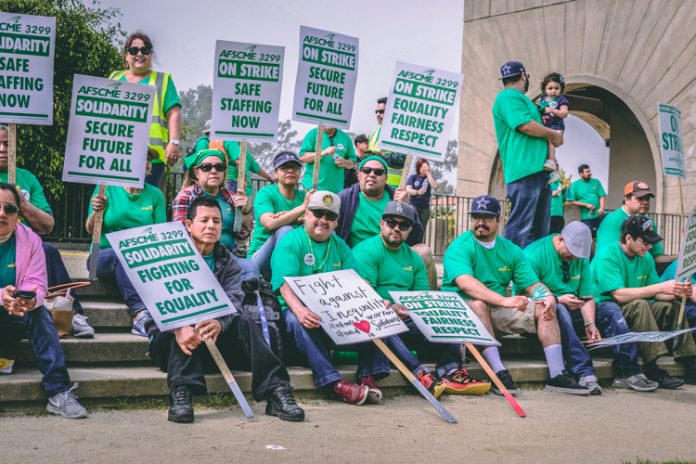
Jacob Wong and Arturo Samaniego
National Beat Reporter and News Editor
The UC Board of Regents converged at UC San Francisco last Tuesday for its bi-monthly board meeting. The regents participated in a full slate of board and subcommittee meetings over the three-day summit, which featured heavy discussion of the UC’s treatment of its workers, and the budget for the upcoming fiscal year.
The American Federation of State, County & Municipal Employees (AFSCME) Local 3299 made its presence felt early on at the meetings. The labor union, which represents more than 24,000 UC workers, recently conducted a series of strikes across UC campuses, leading to collective bargaining talks with the UC system.
AFSCME supporters dominated the public comment portion of Wednesday morning’s meeting. One by one, a parade of UC students, faculty, and workers stepped up to the microphone to voice their support for the strike.
“I am ashamed to be attending a school where women and people of color are paid less than their white and male coworkers, said UC Berkeley student Sarah Abdeshahian. “I am disappointed that the UC has knowledge of these inequities and refuses to do anything about it.”
A research review published in April and conducted by AFSCME using UC employment data found that on average, “Latinos and Latinas earn starting wages 21% lower than white workers, and Blacks earn 20% less than whites.” The review also found that “average starting wages for women are as much as $2 per hour less than men.”
“We’re fired up, and we can’t take it anymore,” said UC worker Edgar Perez. “I’m ready to fight for a good contract. I’m not ready to stop, and everyone in my union feels the same way.”
Following the public comment portion of Wednesday’s meeting, the board returned to regular business. One of the primary items discussed during the meetings was the passage of the UC Office of the President’s budget for the 2018-2019 fiscal year. A panel of six members from the UCOP Budget team broke down the budget into three primary categories: Academic and Programs, Operations, and Finance.
The UCOP budget for the upcoming fiscal year amounts to a total of $876.4 million, a reduction of $33 million from last year’s budget. One item that this figure does not account for is UCOP’s expansion of the UCPath program, which intends to restructure the way the University handles payroll, benefits, and human resources for all its employees.
Under UCPath, the 11 different payroll and human resources systems the UC currently operates would be streamlined into one system. In 2011, the UCOP estimated that the cost to implement UC Path would total $306 million, and save the UC $753 million through staff reductions.
Over time the cost of the program and timeline for its completion have increased. A state audit report released in August 2017, found that the cost of UC Path would total $942 million and would not materialize the projected $753 million in savings.
The Regents also took time to acknowledge the efforts being made by students to lobby the California state legislature to increase funding for the UC system.
In Governor Brown’s most recent budget plan for the upcoming fiscal year, the UC received several one-time increases in funds for different areas including an additional $100 million for deferred maintenance projects. The UC and the UC Student Association have both released statements expressing appreciation for these additional funds, but have also vowed to keep pushing for additional financial support from the state.
“Full-time students have become full-time lobbyists in response to this year’s tuition proposal,” said Judith Gutierrez, president of the UC Student Association, in testimony before the Board. “Our advocacy is a primary reason why individual legislators are willing to consider full funding to the UC.”










